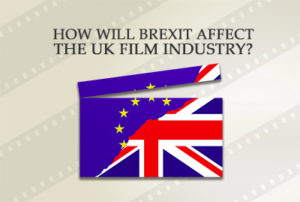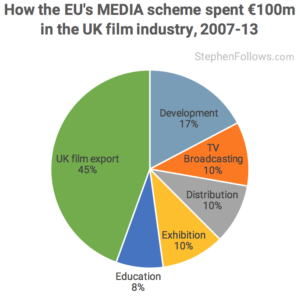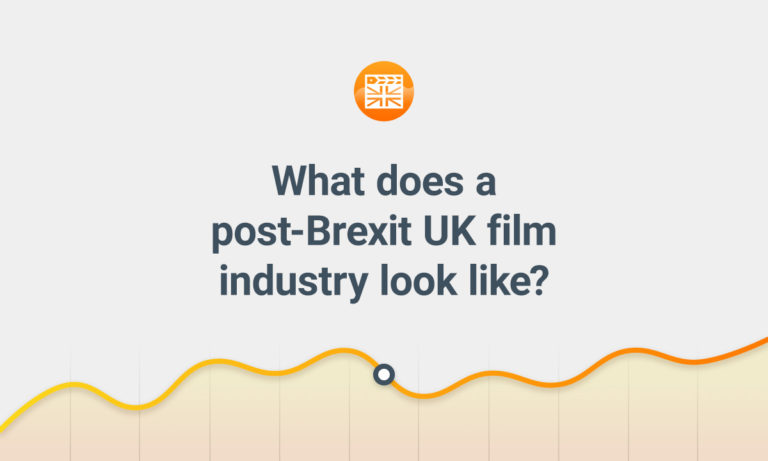 Last Thursday, 52% of the UK voting population opted for the UK to leave the European Union (EU). I am going to avoid the political side of this conversation as it’s been covered well elsewhere. I will also avoid sharing my own opinion on the matter as there are no shortage of people shouting off on one side or another.
Last Thursday, 52% of the UK voting population opted for the UK to leave the European Union (EU). I am going to avoid the political side of this conversation as it’s been covered well elsewhere. I will also avoid sharing my own opinion on the matter as there are no shortage of people shouting off on one side or another.
However, I thought I can add to the conversation by looking at the numbers for how the British and European film industries interact and how Brexit will affect the UK film industry.
Note: A week later I have returned to the topic, based on more research and interviews with over 150 film industry professionals. Both articles address the topic from different angles, so after reading this one I suggest you head over to “What does a post-Brexit UK film industry look like?“.
How will Brexit affect the UK film industry?
It’s worth noting that a large part of the whole Brexit debate was taken up with discussing unknowns. Neither side has a magic crystal ball and so it’s impossible to say for certain exactly what will happen in a post-EU UK. However, some outcomes are almost automatic, in that if the UK stops paying into the EU then it can expect to stop receiving money out of the EU. So, here is a rundown of the negative effects of Brexit to the UK film industry…
 An end to MEDIA / Creative Europe funding (certain). Between 2007-13, the MEDIA scheme provided over €100 million towards various aspects of the UK film industry. The loss of this money is the biggest, clearest effect of Brexit and so I’ve addressed it in the section below.
An end to MEDIA / Creative Europe funding (certain). Between 2007-13, the MEDIA scheme provided over €100 million towards various aspects of the UK film industry. The loss of this money is the biggest, clearest effect of Brexit and so I’ve addressed it in the section below. - In the short-term, British / European co-productions will be harder (very likely). Official co-productions allow international film producers to work together to create a film which can gain state protections and tax benefits from multiple countries at the same time. In the immediate future, co-productions between British and European countries will become harder, due to the fall in the value of the Pound and the growing uncertainty.
- In the long-term, British / European co-productions may need new legislation (unclear). Official co-productions are only possible between countries which have signed a treaty defining co-production rules. The UK currently has active treaties with Australia, Canada, China, India, Israel, Jamaica, Morocco, New Zealand, the Occupied Palestinian Territories, South Africa and the EU. The European treaty is called the European Convention on Cinematographic Co-Production and was signed in October 1992 in Strasbourg. This treaty is not exclusively for just EU members as it refers to its signatories as “member States and the other States Parties to the European Cultural Convention”. The UK signed the original treaty as a member of the EU so conceivably it would need to sign up again as a “European non-member State”. Interestingly, the UK already has a separate co-production agreement with France, signed in 1994, so British / French co-productions may not be affected by Brexit in the same way co-productions with other EU member states are.
- British content will be much less attractive to European broadcasters (almost certain). Some European countries have quotas on the amount of European content their exhibitors and broadcasters must show. For example, the majority (i.e. minimum of 51%) of French entertainment broadcast transmission time must be taken up with programs of European origin. Not only did this increase demand for native UK films and television shows but it also made UK / US co-productions more attractive. For example, ‘The Night Manager’ was a £30 million co-production between the BBC and AMC, which also qualified as an EU production. In a post-Brexit world, it is very unlikely that such products will be classed as ‘European’ and will therefore lose a large part of their value to European countries with such quotas.
- Increased complexities for international cast and crew (possible but unclear). One of the features of a unified Europe is the free movement of people, goods and services. New visa requirements and work permits could affect both British people filming in Europe and European people filming in the UK. That said, the issue is a little more complicated than just ‘in or out’ of the EU. This passport and border controls are covered not by the EU but instead by the Schengen Agreement, and only 22 of the EU’s 28 member states are currently signed up (also, the UK and Ireland have certain opt-outs), In addition, Iceland, Lichtenstein, Norway and Switzerland are members of the Schengen Area but not of the EU. The basics of the free movement of people and services is also not simply an EU issue, but was instead established in the Treaty of Rome. So it’s not clear what would happen post-Brexit as new agreements will need to be reached in order to keep the free movement protections the film industry has enjoyed until now.
- Fewer UK films will be distributed in Europe (certain). EU funding has supported the export of UK film to Europe to a massive degree. In fact, between 2007-13, almost €45 million was spent to bring UK films to European cinema audiences. Details of which films were supported follow in the next section.
 Fewer international films will be distributed in the UK (certain, although the extent is unknown). Between 2007-13, UK-based businesses received over €20 million in EU funding to support the release of European films in the UK. In addition, if Brexit continues to cause a weak Pound then it becomes more expensive for UK distributors to acquire new content. However, this will affect all UK distributors equally, so may only reduce the amount UK distributors can pay upfront (known as the Minimum Guarantee, or MG) rather than prevent distribution entirely.
Fewer international films will be distributed in the UK (certain, although the extent is unknown). Between 2007-13, UK-based businesses received over €20 million in EU funding to support the release of European films in the UK. In addition, if Brexit continues to cause a weak Pound then it becomes more expensive for UK distributors to acquire new content. However, this will affect all UK distributors equally, so may only reduce the amount UK distributors can pay upfront (known as the Minimum Guarantee, or MG) rather than prevent distribution entirely. - UK independent cinemas will lose income. (certain, although the extent is unknown). 56 UK independent cinemas receive funding from the EU as part of the Europa Cinema scheme, which supports cinemas which commit an average of 67% of their programming to European films. Between 2007-13, this averaged out to over €103,000 per cinema.
- The negative effect of uncertainty (very likely). The film industry is highly fickle and responds negatively towards uncertainty. This is partly due to the large amounts of money at stake and the desire to reduce risks wherever possible. Right now no-one is sure what effect Brexit will have on the UK film industry, and so it may seem a safer bet to wait this period of change out before investing in UK film productions.
- Loss of influence on European rules affecting UK content (certain but effects unknown). By leaving the EU, the UK will forfeit its right to influence EU policy towards film and television content. This will most acutely be felt in the discussions around the proposed Single Digital Market, which aims to force distributors to treat the EU as one territory, rather than distributing films country-by-country as happens today.
Despite these negative effects, Brexit could be positive for the UK film industry in the following ways…
 It becomes cheaper to shoot in the UK (uncertain). If the Pound continues to lose value (as it has since the Brexit voted was announced) then the UK becomes ever-cheaper for foreign productions to set up shop in the UK. This will have the biggest effect on Hollywood studios, who spend vast sums of money and whose green-screen epics can be shot almost anywhere in the world. Between 2006-15, UK / USA studios films spent £7.7 billion in the UK, accounting for 68% of the money spent on UK films.
It becomes cheaper to shoot in the UK (uncertain). If the Pound continues to lose value (as it has since the Brexit voted was announced) then the UK becomes ever-cheaper for foreign productions to set up shop in the UK. This will have the biggest effect on Hollywood studios, who spend vast sums of money and whose green-screen epics can be shot almost anywhere in the world. Between 2006-15, UK / USA studios films spent £7.7 billion in the UK, accounting for 68% of the money spent on UK films. - The UK is free to change its tax rules (certain). The current Film Tax Relief (FTR) scheme is very generous and offers producers a refund worth around a fifth of the money they spend on UK films in the UK. As a member of the EU, the UK is bound by rules on State Aid and does not have a free hand to change government incentives and subsidies without EU approval. When the FTR first came in, it gave points for various elements being British, such as the cast, crew, languages used, etc. However, EU rules have forced the UK to widen the criteria to favour all Europeans equally. This means that it is now possible to have a film that qualifies as fully “British” with an all-Italian crew, based on a Spanish story, told in German. Leaving the EU will remove these restrictions on UK film tax policy. This freedom will mostly benefit the unseen civil servants who draw up the actual tax laws, but this increased flexibility means that in theory our film incentives can be changed more often and be better tailored to the needs of the UK film industry.
- Avoid proposed new European rules on release patterns (certain freedom from a possible event). As discussed above, the Single Digital Market could mean that films need to be released in Europe as one territory all at once. It’s not certain how the new rules will eventually be written, but if we’re out of the EU then we’re certainly not going to be part of it. This will still affect British films exported to Europe but not films released in the UK.
- The UK can spend that saved money directly on UK film (extremely unclear). In theory, the UK can use the money saved by not paying into the EU to directly replace the money and support that was lost by the lack of MEDIA funding. It remains unclear if the government wishes to do this.
How much has the MEDIA budget benefitted the UK film industry?
MEDIA currently provides money to the UK film sector for training, development, co-productions, festivals and theatrical distribution. Over a seven year period (2007-13), the EU provided over €100,000,000 towards various aspects of UK film industry. This breaks down as follows…
 €44,561,008 – Awards to European distributors to release UK films
€44,561,008 – Awards to European distributors to release UK films- €10,478,771 – Investment in UK TV broadcasting
- €8,898,821 – Distribution of European films in the UK
- €7,830,252 – Development – UK Slate funding
- €6,939,604 – Development – UK Single projects
- €5,810,965 – UK cinemas part of the Europa network
- €4,910,314 – UK-based training
- €2,975,703 – UK VoD platforms
- €2,775,444 – UK-based film courses and schools
- €2,013,688 – Development – UK Interactive works
- €890,530 – Grants to UK sales agents who represent non-UK European films
- €85,0718 – UK pilot release programs
- €695,500 – European Day-and-Date pilots
- €539,766 – i2i Audiovisual (plugging finance gaps in UK / European co-productions)
- €100,171,084 – Total
As mentioned above, UK films have received a huge amount of EU funding for their releases around Europe. These include…
 The Iron Lady – €1,531,922 – 31 European territories
The Iron Lady – €1,531,922 – 31 European territories- Slumdog Millionaire – €1,339,104 – 24 European territories
- Quartet – €1,339,009 – 23 European territories
- Looking For Eric – €1,297,031 – 26 European territories
- Tamara Drewe – €1,239,843 – 22 European territories
- The King’s Speech – €1,025,717 – 26 European territories
- The Last Legion – €1,025,551 – 3 European territories
- The Duchess – €954,012 – 19 European territories
- Shame – €951,814 – 27 European territories
- Another Year – €914,330 – 21 European territories
- I Give It a Year – €892,867 – 29 European territories
- Streetdance 3D – €891,644 – 17 European territories
- Salmon Fishing in the Yemen – €882,124 – 27 European territories
- The Secret of Moonacre – €814,964 – 5 European territories
- Song for Marion – €787,987 – 15 European territories
- Happy-Go-Lucky – €750,173 – 24 European territories
- Hysteria – €748,066 – 25 European territories
- Fish Tank – €737,813 – 29 European territories
- Nowhere Boy – €708,871 – 8 European territories
- The Angels’ Share – €699,286 – 27 European territories
- A further €25,028,880 awarded to other UK films
Finally, it’s worth mentioning some of the European films that have reached UK cinema audiences in part because of EU funding. These include A Prophet, The Great Beauty, Gomorrah, I Am Love, Persepolis, Love is All You Need, The Class, Amour, Potiche, Waltz with Bashir, Heartbreaker, Of Gods and Men, Blue is the Warmest Colour, Pina, Two Days In Paris, The Counterfeiters, The White Ribbon, Melancholia, Antichrist and Molière.
What is the UK film industry’s opinion on Brexit?
It’s fair to say that the vast majority of people working in the UK film industry are firmly against the UK leaving the EU. UK arts pressure group the Creative Industries Federation say that 96% of its members supported the Remain campaign and 84% said that EU membership was important to the future of their organisation. A poll by Media Business Insight found that 66% of people working in the UK film industry felt that Brexit would have a negative impact on the sector. A further 18.5% were uncertain on the outcome of Brexit, with only 11.5% believing that Brexit would be positive for the UK’s film industry.
So why are so many UK film professionals against Brexit? This could be for a number of reasons…
- Political values. The film industry is traditional a fairly liberal-minded industry and the liberal cause is largely pro-EU.
- Geographical location. The majority of UK film jobs are located in London and London was a hotbed of anti-Brexit sentiment (60% of London voters opted to Remain).
- Age. The film industry has much lower age profile than the UK population, and polls have shown how the majority of those under 50 supported Remain while a majority of those over 50 supported Leave.
- Fear of uncertainty. The UK film industry is in a period of stable growth, thanks in large part to a stable government approach to film incentives. Uncertainties in the future could scare off investors and studios from making investments in UK films.
- The majority of predictable outcomes to the UK film industry are negative. The list at the top of this article shows how the vast majority of expected Brexit outcomes are negative for UK film.
Here is a summary of press coverage on the issue…
 Screen Daily says that the UK film and TV sectors are in “limbo” and that “the two sectors had recently expressed strong sentiment in favour of remaining in the European Union, which is the major trade partner of the UK and which provides millions of pounds in subsidies to the UK market as well as a number of frameworks for coproduction. That structure is now in serious doubt“.
Screen Daily says that the UK film and TV sectors are in “limbo” and that “the two sectors had recently expressed strong sentiment in favour of remaining in the European Union, which is the major trade partner of the UK and which provides millions of pounds in subsidies to the UK market as well as a number of frameworks for coproduction. That structure is now in serious doubt“.- Variety collected views from a number of major voices in UK film, summing them up by saying “British voters’ stunning decision to turn their backs on the European Union has left many of the country’s leading TV and film players reeling“.
- The Guardian summed up the situation by saying that there would be “less cash, fewer movies” and also that “we could witness a 70s-style British film meltdown”.
- The Hollywood Reporter led with “U.K. Producers Oppose Brexit”, pointing out that “James Bond producer Barbara Broccoli, veteran David Puttnam, Matthew Vaughn, The King’s Speech producer Iain Canning, Slumdog Millionaire’s Christian Colson and Aardman Animations are among those who outlined their reasons for why staying in the EU is the right call for those who want “to support our current, thriving creative industries.”“.
- Broadcast magazine noted that shares in ITV dropped 19% within a day of the vote being announced, and the Sky share price also fell 8%. Further drops were felt by eOne and Vivendi.
- The Verge discussed the possible effect of Brexit on ‘Game of Thrones’, saying “US productions might feel the effect, too. Much of HBO’s Game of Thrones is filmed in Northern Ireland, for instance, partly supported by the European Regional Development Fund. HBO, however, says it doesn’t anticipate any financial impact on GoT, since the network took no money from the ERDF for the last few seasons, according to Entertainment Weekly“.
- And the Radio Times pointed out one aspect of Brexit too many experts have overlooked by noting “The shock Brexit result will have massive ramifications – not least the fact that we may see less of beautiful French actress Clémence Poésy on TV“.
A number of top UK film voices have shared their views and I could fill an entire article with them. However, for the sake of brevity, here are five which seem to sum up the mood…
 Harvey Weinstein said “I’m shocked… These guys who voted, voted out of fear. It’s a huge mistake… It could be very costly in the movie and TV industry in terms of content branding. European branding is very important. It’s a big deal for these young British filmmakers”.
Harvey Weinstein said “I’m shocked… These guys who voted, voted out of fear. It’s a huge mistake… It could be very costly in the movie and TV industry in terms of content branding. European branding is very important. It’s a big deal for these young British filmmakers”.- Michael Ryan, Chairman of the Independent Film & Television Alliance, said “The decision to exit the European Union is a major blow to the UK film and TV industry. Producing films and television programs is a very expensive and very risky business and certainty about the rules affecting the business is a must. This decision has just blown up our foundation — as of today, we no longer know how our relationships with co-producers, financiers and distributors will work, whether new taxes will be dropped on our activities in the rest of Europe or how production financing is going to be raised without any input from European funding agencies. The UK creative sector has been a strong and vibrant contributor to the economy — this is likely to be devastating for us”.
- Danny Perkins, head of Studiocanal UK said “Short term it’s bad news for the currency and terrible news for film acquisitions, which are normally done in dollars or euros. UK companies will suffer in the short term“.
- Rebecca O’Brien of Sixteen Films said “It has blown us out of the water. We are very dependent on our relations with Europe. All of our films for the last 20 or 25 years have been co-productions with Europe. It (Brexit) doesn’t mean they will stop immediately but it means that trade, and access and all those things are much more difficult. It just means we have to re-invent the wheel again“.
- Jeremy Thomas of the Recorded Picture Company quoted Charles Bukowski by saying that “the problem with the world is that the intelligent people are full of doubts, while the stupid ones are full of confidence“. Mr Thomas added “For the film industry, it is a disaster“.
So what now?
 So many of the effects of Brexit are unknown. Right now, the only thing that has happened is that a non-binding referendum was marginally won by the pro-Brexit movement. There’s no doubt that the majority of the UK film industry hopes that Brexit doesn’t happen. Failing that, the film industry is likely to seek the following outcomes from the government…
So many of the effects of Brexit are unknown. Right now, the only thing that has happened is that a non-binding referendum was marginally won by the pro-Brexit movement. There’s no doubt that the majority of the UK film industry hopes that Brexit doesn’t happen. Failing that, the film industry is likely to seek the following outcomes from the government…
- A deal to retain co-production advantages with EU countries. Most likely this means ensuring that the UK remains signed up to European Convention on Cinematographic Co-Production.
- An agreement to classify UK content as “European” in relation to production and distribution quotas. This is a harder task than the co-production deal, although it should be noted that Switzerland has already achieved this for their content.
- Replacement funding be provided for current MEDIA-funded activities. A major claim of the Leave campaign was that the UK would save £350 million a week by leaving the EU. It turns out that once you take into account the UK’s rebate the real saving is far lower, but even taking that into account, the money saved by leaving the EU could be used to replace the funding currently provided by MEDIA.
- Action to be taken swiftly and confidently. A protracted and messy exit will create a large amount of uncertainty and stifle investment in UK film.
Epilogue
Sorry if you were expecting to be able to read my final article in my series on film locations today. I have had a number of people ask me about how Brexit will affect the film industry so I bumped the film locations article to next week. Stay tuned…





Comments
You might also mention exclusion from the forthcoming AVMS Directive, which promises a boost for European content; and exclusion from the copyright reforms of the forthcoming Digital Single Market, which promises improved terms for authors as well as changes to cross-border territorial licensing. Whatever the new regime, we won’t be part of it and will have to negotiate bilateral agreements instead (unless we decide to remain in the Single Market, in which case, one might ask ‘what was the point’?)
Excellent analysis as ever thank you! Although as a recent entrant into the industry it does kind of make me want to pack up and go home. When someone like Jeremy Thomas says this is a disaster then it would take a large amount of demented optimism to disagree.
Thank you! You are amazing.
Aren’t you supposed to be on honeymoon?! But, as always, clear headed and insightful.
First thing I did after we got back. I was going to add an eleventh item to the list “Depressed Stephen on Honeymoon” but I opted for brevity.
Congrats, belatedly
My analysis is simple, as the one i have seen when they triple the university cost. More americans, Japanese, Chinese and Russian IN, most European OUT. (unless your parents are loaded). Same technique applied with this event.
Superb analysis, Stephen. It reveals how a) all the ‘bad’ things are more or less certain, and b) the ‘good’ things are extremely precarious. Worrying times for an industry that has had more than its fair share of worrying times here in the UK.
While entirely appreciating uncertainty isn’t ideal, continuing to bang the negativity drum isn’t helpful either. I know you’ve stated a couple positives but this isn’t the prevailing party line the UK film industry needs.
This article leaves out the fact that Brexit doesn’t and won’t mean the UK (or EU) will suddenly have less able or desirable crew, production companies, studios, distributors and so on. It also doesn’t mention that the UK’s government are quite obviously aware of how important the film industry is to GDP (http://www.bfi.org.uk/education-research/film-industry-statistics-reports/reports/uk-film-economy/economic-contribution-uks-film-sectors) thus will probably be inclined to protect it (https://www.gov.uk/government/news/chancellor-were-backing-british-film-industry).
I know it’s early days and no one know’s what’s happening next but to assume Europe (and the rest of the world) won’t suffer greatly too if they don’t come to amicable working agreements with the UK and visa versa is absurd.
It may well look bleak now but the more this negativity that’s pumped into the ether by the media the worse it’ll be for everyone. One of the first lessons I learned on set, nearly a decade ago, was to come to people with solutions not problems. To that end I have full faith the UK and EU film sectors will move forward intact and stronger for the experience. It’ll be bumpy for every industry for the short term but long term the world’s demand and consumption of film isn’t going to stop and nor will the global film industry.
Hi Becky
Thanks for your comment – good points and the debate is all the better for them being added here.
My aim is to give a fair, balanced point of view of how it currently looks for UK film post-Brexit so I hope that you don’t feel my article is making a case in one direction or another. I will happily add any missing potential benefits, coverage or voices which speak to the pro-Brexit point of view. As it stands right now, I don’t know of any I have missed off.
You’re right that the government seems connected to the value of film, and there are certainly a number of actions they can take to minimise disruption and take advantage of a post-Brexit world. They could easily replace the MEDIA money we’ll lose as it’s a fraction of a fraction of the total paid in. If it comes to it, we as an industry need to ensure they do.
I’d add that people, government and countries don’t always act in their economic self-interest so we can’t be too sure that new agreements will be drawn up quickly and with the same effect they currently have. Part of what the EU will need to do to sure itself up against further exits is to increase the Moral Hazard of leaving. If the UK manages to get all of the benefits of EU membership with none of the costs / drawbacks then it will inevitably lead to a wave of other countries seeking to exit. I’m not saying that’s a good or bad thing, but just that on this level of politics there will often be actions taken that don’t only take into account the economics.
What we need now is a reasoned, fact-based debate and then actions to be taken. That’s what I’m working towards and that is the intention with my article, rather than fear mongering.
Thanks! Stephen
Completely agree but the point of my comment is that it’s very easy to draw an audience with reams of negative statements that are as uncertain as a few potential positives.
You’re clearly a good writer who understands the industry well. The industry could benefit from people like you making grounded optimism the leading factor in articles instead of the reiterating the bad. I’m sick to death of negativity being the underlying feature of everything I’m reading.
“The longer we dwell on our misfortunes, the greater is their power to harm us.” Voltaire
Here’s to stepping into the unknown with trepidatious confidence. We will succeed either way because the technicians, producers, directors, editors etc, of this country and brilliant and have been leading the way in many areas of film for years. I highly doubt such vivacious and ambitious people will be rendered undone by politics. A point which should be recognised and shouted about far more loudly at a time like this.
I understand your point, and welcome all useful comments on this blog, very much including yours.
I don’t feel that my article is skewed in one way or another. I’ve tried to keep my own views out of it as it’s not my place to campaign for either side. I want to provide a clear, researched piece on what could happen in a post-Brexit world. The piece explains all of the negative possible outcomes I can think of, all of the positive possible outcomes, shares the public views of the industry and then provides suggestions of next steps – this feels like the right way to approach such a contentious issue, no matter what one’s opinions on the matter are.
I’ve been careful to provide a weighting for how likely each outcome is, which, although highly personal, should hopefully help people decide for themselves how relevant each point is.
As I’ve mentioned before, if I’ve missed any positive outcomes (or if any negative ones are wrong or irrelevant) then please do let me know and I will update the piece. I don’t pretend to know all of the answers and always welcome input from all.
But I do disagree that I should act as a ringleader for optimism. My place is not to be optimistic nor pessimistic, but to provide a fair, balanced view of the facts. Then each person can make up their own mind. Much analysis of the film industry ends up feeling pessimistic but I would contend that that is not a result of the messenger but of the underlying truth. The same is the case in this article on Brexit – when I totted up all possible outcomes it produced a longer list of negatives than positives. That’s not an opinion or viewpoint but just the way the facts lay. I wouldn’t want to short-change the audience by underreporting one aspect for parity, nor to skew the overall piece to provide an easier read.
On a final note – I totally get your overall point. There’s a huge amount of bleakness in the news, on social media and in conversation around Brexit. Both sides are extremely guilty of lies and of disrespecting the public. And the big answer is “We don’t know what will happen”. This sucks. But it’s only through fair and balanced reading of the situation that we can we start to build a plan to move to happier times. No one blog article can provide all the answers but hopefully we can start a conversation about what to do next.
It’s a realistic article,which I’m afraid is bound to be rather negative at the moment. It’s very difficult, Debbie, to be overly optimistic when such a cataclysmic thing has occurred. People take time to recover and decide what to do. Of course we we all know we are in the industry of “bringing solutions” but it’s VERY early days for acceptance. I remember when the industry was virtually dead after all the tax breaks disappeared in 2007 and it was horrific. It was also non existent when I started in this industry, so I’ve seen both sides. I am sure we will survive because we have to, but it’s going to be bumpy, maybe not immediately, but further down the line. I’m still seething and I find it hard, when people tell me to calm down about it and accept this- so respectfully I will take time to feel less negative than I do right now. Stephen’s excellent article is clear and only states the facts as known right now.
Becky, since reading your comments a few days ago I had to think about your contribution repeatedly. Partly because my own experience differs, and also because I was part of many discussions across the country leading me to see a different picture emerging.
I found many seemingly rooted in their own national context keen to ‘get on with it’, and relying on British pluck. But Italians, Spaniards, Finns, Danes and even Irish as well as those Brits who move around the world and work directly with international partners see the situation differently. I have heard several recent first hand accounts of racism, and people from a variety professional backgrounds fearing about both their own standing and business relationships they consider vital.
Your suggestion to come to people with solutions rather than problems is a good one – if a workable solution is indeed available. But you can look at authoritative news sources of any creed unable to reconcile ‘full Brexit’ expectations with EU policy.
Discussions like the one right here may define this country and its film industry. One aspect of the European idea I believe in is that people who come to a (national) issue from different cultural backgrounds make an important contribution. It may well be necessary to stop in our tracks and look at the problem with all the intelligence and creativity we can muster, and pass it around before a solution that accommodates all stakeholders can be found.
“History repeats itself, the first time as tragedy, the second as farce.” Attributed to Karl Marx.
“come to people with solutions not problems” – very well said Becky!
I agree – hence the last section of my article, which is a list of the four things which occur to me to be the next steps.
Becky has nailed it. The tax credit is the key and it’s staying.
Amen! Great comeback.
Excellent article and sadly all rings after listening to all our sources. I know that a lot of people and companies, like ourselves at Fizz and Ginger Films, have already had projects stalled and very likely canned because of us leaving the EU even in these short few days. There are also plans for people to move to the U.S, again us included. Sad times.
Really excellent piece, Stephen. Thank you.
No mention of real negative: impact on cost/availability of Ilford and Kodak film (still and cinema).
Many thanks for the excellent analysis!
Excellent and well-balanced article. Something to note, regarding the plummeting pound making it more attractive for Hollywood. Yes, that’s true. But the side effect that comes with that must be guarded against, and it’s this – foreign service productions are great for below the line crew, and that creates a perception that the film industry is doing just fine. But in reality, those foreign productions do absolutely nothing for developing the indigenous film industry, and in fact work against it because of that misperception. So British film will suffer, even while British makeup artists and camera ops, etc are thriving. This is what happened in Canada, where the weak Canadian dollar brings Matt Damon and the gang to Toronto every second week, and the government toots its own horn very loudly about how great the film industry is doing, while Canadian creators can’t find work to save their lives. There’s nothing in the coffers for development of good Canadian cinema, and no commitment to changing that as long as they can say “but look, they shot Suicide Squad here.” It’s one of the many reasons I moved back to the UK (lucky me, having dual citizenship). So I hope that if Brexit goes forward (and I’m still optimistic it won’t) that the UK industry will lobby ferociously to keep protections for British content creators and script development, and not let the decision makers be distracted by Hollywood tentpoles.
Make a really good film about Brexit that loads of people want to see. Sorted.
Great article dude, although not ‘great reading’ let’s hope for some sensible future developments. ð
Samantha Clare Kininmonth
Doom and gloom ð© I’ve read quite a few articles xxx
I wasn’t going to tag if it was all doom and gloom. There are some positives. ð
Does that mean if US investment rises 1-2% it would net cover the cash cost to the industry?
Nice thought, but sadly not.
Firstly, US money is not “investment” as very little of it is designed to help the UK industry long-term. Granted some productions do look to make a lasting impact (WB in London and Game of Thrones in NI) but mostly it’s temporary spending. Many of the MEDIA pots of money were / are designed to build skills, infrastructure and ideas.
Secondly, the US influence was exactly what MEDIA was working to counter-act. The vast majority of the EU money went to indie productions and companies.
Finally, it’s also the loss of skills and institutional knowledge within the MEDIA / Creative Europe structure that we will lose.
I see the cultural & developmental cost is devastating, but that’s why I asked specifically about cash cost. Is it possible that total industry wealth – and perhaps its total employment numbers – remains roughly the same?
Oscar Sharp Not all money is equal so it’s not possible to see things in those simple terms. Kinda like your significant other leaving you but you also gain a stalker – same number of people are interested in you…
Thanks for the analysis Stephen, much appreciated!
Just to further clarify on point 5.:
The UK was never a signatory to the Schengen Agreement, so “Brexit” won’t change anything with regards to border controls. But it’s not 100% correct to say “not covered by the EU”, the Schengen Agreement was incorporated into EU law by the Treaty of Amsterdam in 1999, maintaining the opt-out of the UK and Ireland. Which is why you can travel from Berlin to Paris without being stopped ot having to show a passport or ID card, but still have to go through passport control when travelling from the mainland to the British Isles.
The Treaty of Rome was the treaty which established the EEC in 1958, and is known since the Treaty of Lisbon in 2009 (which amended the Treaty of Maastricht and the Treaty of Rome) as “Treaty on the functioning of the European Union”. It defines the fundamental basis of the EU: the “common market of goods, workers, services and capital”. This is today often referred to as “free movement of goods, services and labour” and equally often misunderstood as a reference to physically moving things or people from A to B, when actually this refers to all EU citizens or EU companies having the right of buying or selling goods across all EU member states, offering or using services across all EU member states and being able to work in any or all EU member states.
Invoking article 50 of the Treaty of Lisbon is an exit from all EU treaties, including the Treaty of Rome and Treaty of Maastricht.
Thank you for this, much needed information, depressing though it may be
I thought the UK was the second largest net contributer to the EU so can’t the film industry focus on removing the EU 27 nation middle man committee (unless they added value?) and go direct to the UK government for funding?
Well, yes and no.
The term “net contributor” only looks at cash flow, not at added value to the economy by being a EU member. The UK’s contribution to the EU amounted to 1.47% of the UK’s annual public revenue. Should Brexit cause a recession which leads to the UK’s public revenue (=tax income) to go down by 1.47% or more, the UK has gained absolutely nothing financially by no longer paying contributions to the UK.
Also the UK’s focus in terms of film incentives has (as far as I can tell) always been inward investment, i.e. films that are commercially viable and promise a return on investment, whereas the EU’s incentives more often than not aim at maintaining cultural diverstity and national identities, and help funding films which might otherwise be deemed to risky commercially to fund through the usual routes.
The question then become one of: do we want a UK film industry which focuses solely on servicing US blockbusters, or do we want film with a unique British identity, and if so is the DCMS going to help with that or focus solely on the economic contribution of the media sector to the UK GDP.
Good point, Joe.
I agree that successive UK government have certainly been doing all they can to attract inward investment, although it’s fair to say that its principle method of support (the Film Tax Credit) is as open to smaller, domestic productions. In fact, until recently, films under £20 million actually got a bigger advantage than those over £20 million.
There is no minimum spend to access the UK Film Tax Relief, unlike in Ireland, which excludes productions from the incentive if “their Eligible Expenditure is less than €125,000, or the total cost of production is less than €250,000”. (http://www.irishfilmboard.ie/financing_your_film/Section_481/5). They are actively looking to build a service industry at the cost of their homegrown, low-budget filmmaking talent.
Unconnected to Brexit, the vast majority of BFI money doesn’t go to inward productions but to smaller projects, training, infrastructure, etc. The FTR is open to all films, no matter their ‘quality’ or origin, whereas BFI and MEDIA have a much tighter requirement for awards. So if a post-Brexit UK government wishes to replace the missing MEDIA money then hopefully they will do so in an equally targeted manner, rather than something which could be accessed by inward productions.
There is also another risk you forgot to mention Stephen, and nobody is talking about, and it’s what’s going to happen with future trade deals, with say, the U.S., who could perfectly demand that the UK abandon it’s Film Tax Credit, given how big their Entertainment industry is and they provide very little tax incentives, and how many Jobs it’s losing to Canadian, NZ and UK tax credits, it’s actually quite likely that this is something they will probably bring to the table in future trade negotiations…
Wow the eu helped me with my funding i must say lol in the 1960s the uk film indestry was booming! Long before the EU was with us.
Most of this is scare stories because remain lost. As though the eu went round to all uk film makers and said here u go theres a budget. Complete nonsense. The Eu was far from saints.
The Brexit vote is a victory for idiotocracy, turkeys voting for Christmas. And that’s me being positive (or at least keeping it clean).
On the negative side, there’s also the loss of soft money from various regional development pots, like the European Social Fund and European Regional Development Fund. The former has supported many a film training and education project across the UK, and the latter provided the basis for Screen Yorkshire Yorkshire Content Fund (an excellent scheme which attracted private match funding).
Closer to my home, money from the European Agricultural Fund for Rural Development is currently parceled into small scale projects supporting rural communities in the Vale of Glamorgan, via the local council. This led to establishment of a network of community cinemas, including one in my own village, that benefited to the tune of several thousand pounds for screening kit. Most of the films shown by the network are British or arthouse, and the value added to local cultural life is immeasurable. It’s difficult to see local councils supporting audience-facing schemes like this in the face of swingeing budget cuts to local arts provision.
Excellent article, thank you very much Stephen. Best wishes… Mikael
It’s a shame all the in-depth discussion and analysis didn’t take place before the vote. I read extensively on the subject, but had to search to find this kind of information… What a waste!
Sorry But I disagree
Nothing will change for a few years and when it does there may be some changes but for the most part it could be better. The one big thing that is causing problems is those who wanted to remain are making it difficult and that would include EU countries.
Brilliant in-depth analysis, Mark. With incredible, logical arguments backed up with well-researched facts. Quite like many of the ones we heard during the campaign.
Very helpful article, thank you, but PLEASE could you amend the first sentence to read either that “37.5% of the UK population voted to leave” OR “52% of those who voted…”. The current inference is that more than half of the entire population voted to leave which is not quite correct.
It’s a hugely helpful article and a good roadmap to the various elements that need to be considered. Thanks again.
Hi Stephen, few lines just to let you know how much I appreciate your work. Thanks for sharing so much data and valuable information. I enjoyed seeing how the industry respect and support, most of the times, all your opinions. Nice feedbacks also worth to read. You are doing a great job! Anything you need from Spain just let me know. @Paulino_Cuevas